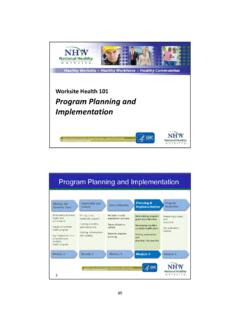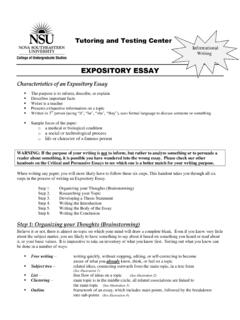Transcription of The importance of learning strategies and how the project ...
1 European Journal of Science and Mathematics Education Vol. 1, No. 3, 2013 137. The importance of learning strategies and how the project kolumbus - kids ' promotes them successfully Dr. Claas Wegner1, Lea Minnaert2 and Friederike Strehlke3. 1 Department for Didactics of Biology, Bielefeld University, Bielefeld, Germany 2 Department for Didactics of Biology, Bielefeld University, Bielefeld, Germany 3 Department for Didactics of Biology, Bielefeld University, Bielefeld, Germany For correspondence: @Universit t Abstract : In education systems learners are expected to possess an increased degree of autonomy and show initiative in learning processes, inspecting learning materials and understanding contents.
2 An efficient growth of knowledge inside and outside of school is only possible if students have skills which initiate, guide and control the search for information and later on its processing and storage. In learning and teaching research these techniques are called learning strategies . They are necessary for students to use in order to foster their application of results in education. Since 2006, the Bielefeld University project kolumbus kids has been promoting scientifically gifted learners by inviting selected students of regional schools to participate in interesting sessions dealing with biological problems and phenomena at university. The sessions are designed and held by university students.
3 So far, this project is a unique concept in Germany in terms of Biology Didactics aiming at an adequate support of students gifted in natural sciences. During the sessions, we noticed that many students are not able to use learning strategies successfully as they had not learned them in school. The paper at hand intends to provide the reader with a brief overview of the project and the six different types of learning strategies defined by Mandl and Friedrich (cf. Mandl & Friedrich 2006). It shows how our project supports the students learning strategies and also presents some inspiration for applications in day to day science teaching. Fostering and improving your students learning strategies is important for them in order to learn successfully .
4 Keywords: learning strategies , kolumbus kids ' project , teaching technique, efficient learning , tips for regular school teaching Introduction In modern education systems learners are expected to possess an increased degree of autonomy and show initiative in learning processes, inspecting learning materials and understanding contents. An efficient growth of knowledge inside and outside of school is only possible if students have skills which initiate, guide and control the search for information and later on its processing and storage. In learning and teaching research those techniques are called learning strategies . Since 2006, the Bielefeld University project kolumbus kids ' has been promoting gifted children between ages nine to twelve, whereas learners aged fifteen to nineteen are tutored in the program kolumbus Youth'.
5 Selected students of regional schools are invited to participate in interesting sessions dealing with biological problems and phenomena at university. The projects' sessions are mainly designed and held by university students planning to become teachers. They are also supported by academic staff of the Department for Didactics of Biology. This means that the students get the opportunity to improve competences important for their future career as a teacher, for example designing and realizing teaching units or identifying and dealing with different student personalities. So far, this project is a unique concept in Germany in terms of Biology Didactics aiming at an adequate support of the gifted regarding natural sciences.
6 In the sessions we noticed most of the children do not have any efficient learning strategies since they have not learned them in school. This is why the project uses certain teaching methods in order to offer the participants aid and guidance on learning those 138 European Journal of Science and Mathematics Education Vol. 1, No. 3, 2013. strategies , promote the individuals' already established learning strategies and their creation of new knowledge. For further information please visit the project 's homepage (cf. Borgmann & Wegner 2011, 80 81; Wegner & Minnaert 2012, 20). Current psychological and pedagogical research focuses on students' learning processes in general and also on which learning strategies students should be introduced to enable effective and autonomous learning .
7 The term learning strategies does not describe one uniform, scientific concept. It rather summarizes various concepts of different research groups. Whereas Mandl and Friedrich see learning strategies as sequences of action to reach a learning goal, Lompscher describes them as the following: learning strategies are procedures which are more or less complex, differently advanced, intentionally or unconsciously used to realize learning goals and to cope with learning requirements (cf. Mandl & Friedrich 1992, 6; Lompscher 1996, 2). Weinstein and Mayer understand learning strategies as internal and external actions influencing the learner's motivation, attention as well as selection and processing of information (cf.)
8 Weinstein & Mayer 1986, 1). This article will use Mandl's and Friedrich's definition that learning strategies are targeted processes which are first applied intentionally and then gradually automated. This is the basis for the article's presentation of learning strategies which will be structured into the following six types, also defined by Mandl and Friedrich (cf. Mandl & Friedrich 2006): Cooperation strategies Elaboration strategies Motivational and emotional strategies Revision strategies Organizational strategies Control strategies This article intends to provide the reader with a brief overview of the project and six different types of learning strategies . It shows how our project supports the students learning strategies and also presents some inspiration for applications in day to day science teaching.
9 Generally, the concept of learning strategies is very important. More teachers need to be aware of it and should improve their students learning strategies as well as to help them learn learning strategies in the first place. Cooperation strategies In today's society, learning is a cooperative process which includes social interaction. Already in 1977, Tough carried out first examinations to prove the positive effect of cooperative working on small children's learning success to show that children can learn and increase their knowledge without teachers (cf. Tough 1977, 35). Cooperative learning means that students support each other in working to reach a common result.
10 This happens in pair or group work. As a basic requirement for successful learning in such environments, certain conditions have to be fulfilled. One of them is to create a pleasant learning environment. Therefore, the teaching organization should ensure that spatial and temporal conditions support the students' cooperation. The task assignments have to fit pair or group work so that children are enabled to use cooperative skills, such as conversational skills, decision making, communication and conflict management. The teacher should not leave the students alone, but rather function as a learning aid by creating a tutorial learning environment. The working groups' size is also essential for cooperative learning since they should not have more than three to four members.














